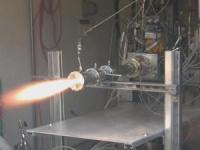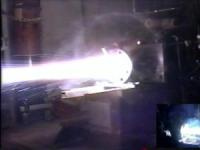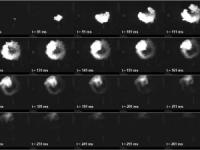IN Space's Research and Development Focus
 IN Space has been conducting ground-breaking research into liquid rocket propulsion systems since its inception in 2003. We specialize in bringing about innovative and reliable liquid rocket engine (LRE) subsystems including bipropellant injectors and combustion initiators to enable new missions and dramatic reductions in program costs and risks for existing or emerging systems and their desired propellants. Current efforts in our liquid propulsion research area are focused on producing combustion instability prediction tools for LRE systems of interest to the U.S. Air Force new booster development program.
IN Space has been conducting ground-breaking research into liquid rocket propulsion systems since its inception in 2003. We specialize in bringing about innovative and reliable liquid rocket engine (LRE) subsystems including bipropellant injectors and combustion initiators to enable new missions and dramatic reductions in program costs and risks for existing or emerging systems and their desired propellants. Current efforts in our liquid propulsion research area are focused on producing combustion instability prediction tools for LRE systems of interest to the U.S. Air Force new booster development program.
 Drawing upon years of experience from company principals and valued consultants, IN Space began researching hybrid propulsion systems in 2008 as part of an SBIR seeking to reduce fuel grain slivering and increase the energy management of hybrid propulsion systems. In this effort, we demonstrated 1) smooth, repeatable ignition of candidate propellants, 2) regression rates 50% higher than in previous studies of the propellants, and 3) throttling ratios of nearly 10:1 with stable combustion. Propulsion systems which can benefit from these features are currently being investigated.
Drawing upon years of experience from company principals and valued consultants, IN Space began researching hybrid propulsion systems in 2008 as part of an SBIR seeking to reduce fuel grain slivering and increase the energy management of hybrid propulsion systems. In this effort, we demonstrated 1) smooth, repeatable ignition of candidate propellants, 2) regression rates 50% higher than in previous studies of the propellants, and 3) throttling ratios of nearly 10:1 with stable combustion. Propulsion systems which can benefit from these features are currently being investigated.
 IN Space and Purdue University are currently developing a new and unique binder for composite solid rocket motors. The research team has demonstrated unenhanced burn rates of up to 0.9 inches per second at 700 psia pressures in ballistic motor test firings. Gumstock samples of the binder have achieved a tensile strength 40 times that of hydroxyl- terminated polybutadiene (HTPB). Subscale sensitivity tests have also shown this new binder to have some advantages over an HTPB fuel grain with equal solids loading. Current efforts are aimed at further refining the propellant formulation, continuing to assess the composite propellant’s mixing and combustion characteristics, and improving the binder’s strain capabilities.
IN Space and Purdue University are currently developing a new and unique binder for composite solid rocket motors. The research team has demonstrated unenhanced burn rates of up to 0.9 inches per second at 700 psia pressures in ballistic motor test firings. Gumstock samples of the binder have achieved a tensile strength 40 times that of hydroxyl- terminated polybutadiene (HTPB). Subscale sensitivity tests have also shown this new binder to have some advantages over an HTPB fuel grain with equal solids loading. Current efforts are aimed at further refining the propellant formulation, continuing to assess the composite propellant’s mixing and combustion characteristics, and improving the binder’s strain capabilities.

The cross-discipline nature of designing and studying propulsion systems and the need to control high pressure, high temperature fluid flows with some of the highest heat fluxes of man-made systems creates a diverse knowledge-base and complementary set of skills appropriate for investigating a wide range of physical phenomena. We have used this knowledge and these skills to prediction and examine combustion instabilities in gas turbine augmenters, evaluate the decomposition mechanisms of monopropellants, and investigate the combustion of a cloud of nano-particles.

